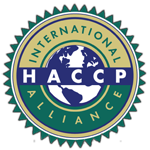Alaska HACCP Training & Certification
HACCP Certification Training Program
HACCP (Hazard Analysis Critical Control Point) is the internationally recognized risk-based system for managing food safety and involves identifying physical, biological and chemical hazards during food handling and preparation stage. HACCP is a system comprised of seven principles that are the core for the application of HACCP to a food safety program.
Our HACCP certification training courses provide the practical and technical information you need to develop, implement and manage a successful HACCP system and are accredited by the International HACCP Alliance.
Food Handlers
Alaska food handler safety training is necessary for employees in the food service and hospitality industry working in food facilities who are involved in preparing, storing, or handling food. The food handler safety training course will discuss the various food safety issues, regulations, and techniques needed to maintain a food-safe environment.
Certified Food Managers
Food establishments and food vendors generally need to have a certified food manager (CFM) who is required to have a food safety manager certification. The Food Safety Manager Principles Course provides the necessary training to help the food manager prepare for the nationally-accredited ANSI Certification Exam.
The ANSI Certification Exam certifies that the food manager has the knowledge required to manage a food safe facility or establishment.
The Food Manager Certification is usually valid for 5 years, but in a few local jurisdictions this may vary, so make sure to check with your local health authority. Food managers are chefs, cooks, servers, and food preparers employed in: restaurants, cafes, bakeries, delis, mobile vendors, food trucks, bars, convenience stores - and as caterers.
Alabama Food Safety & HACCP Courses
- Food Handler
- Food Manager
- Seafood HACCP
- HACCP - 4hr
- HACCP - 16hr
Food Handler Safety Training Card/Course
Course Description
The Food Handler Training course will cover basic food safety issues, regulations, and techniques needed to maintain a food-safe environment. It will help the learner better understand how handling food correctly is not only the law, but it improves safety and reduces risks.
At the conclusion of the course, the learner will be tested on their knowledge of the learning objectives and content. Upon successfully passing the exam, the learner will be issued a Food Handler’s Certificate (or Card).
Audience: Chefs, cooks, mobile food vendors, bartenders, host/hostesses that handle food, bussers, caterers, wait staff,servers, supervisors and managers, food warehouse staff, and convenience store (c-store) clerks.
ANSI Reference: http://ansi.org/Accreditation/credentialing/certificate-issuers/AllDirectoryDetails.aspx?&prgID=237,238&OrgId=536&statusID=4Credit Hours: 2 hrs
Cost: $7.00
Course Outline
At the conclusion of the Food Handler Training Certificate program, you should be able to:
- Identify biological, physical, and chemical contamination.
- Identify foodborne illnesses, signs of food spoilage, types of food prep contamination, and proper temperature control methods.
- Safely store and prepare meat, poultry, and vegetables.
- Demonstrate effective food handling techniques that promote cleanliness and safety in food establishments.
- Discuss the importance of proper personal hygiene in the workplace.
- Implement appropriate procedures to receive and store food.
- Summarize practices for properly cleaning and sanitizing food contact materials and surface.
Course Completion:
A certificate of completion will be issued to individuals who meet the following course requirement:
- Minimum seat time of 75 minutes
- Completion of the course and successfully passing the final exam with a minimum passing score of 75%
Individuals who do not pass the exam on the first attempt will be allowed one additional attempt to review the course content and pass the final exam
Food Safety Manager Training Course & ANSI Certification Exam
Course Description
The Certified Food Manager (CFM) Training Program accredits and licenses owners or employees of food facilities that supervise the preparation, handling, and/or serving of food.
- The Food Safety Manager Principles Course provides necessary training to help you prepare for the nationally-accredited ANSI Certification Exam.
- The ANSI Certification Exam is taken to certify that the food manager has demonstrated that he or she has the knowledge, skills and abilities required to protect the public from foodborne illness.
- The Food Manager Certification is usually valid for 5 years. However, in a few local jurisdictions this may vary, so make sure to check with your local health authority.
Our Learn2Serve Food Protection Manager Certification is approved by the American National Standards Institute and the Conference for Food Protection (ANSI-CFP). This accredited exam is accepted in all states that have mandatory certification requirements for Food Management Professionals. The exam will be proctored by an employee at the 3rd party test center location. * Note: Except Texas - which is entirely online.
Course Hours: 8 Hours
Exam Duration: 1.5 Hours
Course Outline
- Lesson 1: Introduction to Food Safety
- Lesson 2: Biohazards, Foodborne Disease, and Food Spoilage
- Lesson 3: Contaminants
- Lesson 4: Food and Temperature Control
- Lesson 5: Employee Health, Hygiene, and Training
- Lesson 6: Purchasing, Receiving, and Storing Food
- Lesson 7: Cleaning and Sanitizing
- Lesson 8: Pest Control
- Lesson 9: Facility Design
- Lesson 10: HACCP System Basics
- Lesson 11: FDA Guidelines for Developing a HACCP System
- Lesson 12: Developing, Implementing, and Maintaining a HACCP Plan
- Lesson 13: Seafood HACCP
- Lesson 14: Consumer Steps to Safer Seafood
ANSI Certification Exam
To be certified as a food manager, the individual must pass an accredited food safety examination - administered by a certification provider.
The Learn2Serve Food Protection Manager Certification is approved by the American National Standards Institute and the Conference for Food Protection (ANSI-CFP). With the exception of Connecticut, this accredited exam is accepted in all states/jurisdictions that have mandatory certification requirements for Food Management Professionals. Reference: ANSI (American National Standards Institute)
Help with Exam
We have partnered with PSI - a global testing, certification, and licensing provider. The exam is proctored at a PSI test center location.
After purchasing the exam, you should receive an email from PSI instructing you how to schedule your exam. If you do not receive this email, please contact support at 877.881.2235.
You can also click here to schedule exam online at a testing center near you.
Upon successful completion of the exam with a passing score, you may download and print a proof of completion document. The official certificate will be mailed within 15 business days of completing the exam.
Seafood HACCP Safety
Course Description
The Seafood HACCP online training course was developed to provide an easier method for individuals from the seafood industry and regulatory community to get training on the application of HACCP principles to seafood products.
The Seafood HACCP Course follows the Seafood HACCP Regulation that defines processing as handling, storing, preparing, heading, eviscerating, shucking, freezing, changing into different market forms, manufacturing, preserving, packing, labeling, dockside unloading, or holding fish or fishery products.
Information in this course comes from the Hazardous Analysis and Critical Control Point Principles (HACCP) and Application Guidelines adopted by the USDA and FDA. Code of Federal Regulations 21 CFR Part 123 - Seafood HACCP Regulation - requires all seafood companies (domestic as well as international exporters to the United States marketplace) process products in accordance to HACCP principles as specified in the regulation.
Credit Hours: 1 hr
Cost: $75.00
Course Objectives
After completing this course, the student will be able to:
- Describe why a Hazard Analysis and Critical Control Point (HACCP) management system is an effective means for assuring food safety.
- Identify and distinguish between prerequisite programs for a HACCP management system.
- Discuss areas in which employees must receive education and training in order to understand their roles in producing safe foods.
- Identify the five preliminary tasks to be completed in the development of a HACCP plan before applying principles to a specific product or process.
- Discuss the seven principles of HACCP.
- Identify and describe the two stages involved in conducting a hazard analysis.
- Name and describe examples of possible CCPs.
- Identify and discuss the seven steps seafood companies must follow to help eliminate known hazards.
- Name five ways to test fish for freshness.
Course Outline
This course will discuss the following topics:
- Lesson 1: What is HACCP?
- Lesson 2: Implementation and Maintenance of the HACCP Plan
- Lesson 3: Seafood HACCP
- Lesson 4: Consumer Steps to Safer Seafood
Completion of Course
Each quiz must be passed with a miminum of 70% to proceed to the next lesson. Upon successful completion of the course, the certificate of completion will be available from the training page.
HACCP: The State-of-the-Art Approach to Food Safety
Course Description
Accredited by the International HACCP Alliance, this course aims to teach you the importance and use of all 7 principles in order to make you a safer, more effective food service employee.
Every operation serving or selling food needs to have a food safety system in place that is designed specifically to guarantee the food being served is safe to eat. This specific food safety system is called HACCP for Hazard Analysis and Critical Control Point. HACCP is a system comprised of 7 principles that are to be applied to a written food safety program focusing on the food in your operation.
This course meets the regulatory requirement of compliance with the 2013 FDA Food Code and the USDA Requirements for School District HACCP Plan Implementation.
Credit Hours: 4 hrs
Cost: $50.00
Course Objectives
After completing this course, the student will be able to:
- Identify the key points of HACCP
- Identify the causes of food borne illness
- Explain the 7 HACCP principles
- Apply standard operating procedures for food safety and food defense in your operation
- Follow prerequisite programs for food safety
- Identify the three classifications of recipes
- Apply critical control limits
- Determine critical control points
- Determine effective corrective actions
- Complete monitoring forms
Course Outline
The course consists of the following seven units:
- Unit 1: Introduction to HACCP
- Unit 2: Food Borne Illness
- Unit 3: The Seven HACCP Principles
- Unit 4: Identifying Hazards and Determining Critical Control Points
- Unit 5: Critical Limits, Monitoring and Corrective Actions
- Unit 6: Verification and Record Keeping
- Unit 7: Overcoming Barriers to HACCP Implementation
Completion of Course
Upon successful completion of the course, the certificate of completion will be available from the training page.
Food Safety HACCP for Retail Food Establishments
Course Description
Accredited by the International HACCP Alliance, this course presents the characteristics and application of Hazard Analysis and Critical Control Points (HACCP), a risk prevention management methodology that applies appropriate science and technology to plan, control, and document safe food processes in a food facility, consistent with the FDA’s desire to implement a voluntary HACCP program.
A Certified Food Safety HACCP Manager should be able to perform the following functions: Conducting preliminary activities, conducing hazard analyses, establishing detailed control measures, conducting verification activities, conducting operational implementation activities, and conducting continuous improvement activities.
The course first examines HACCP’s principles and concepts. The HACCP approach begins by identifying biological, chemical, and physical hazards (inputs to the system) associated with facility construction, equipment, employees, food and supplies.
The course also examines the prerequisite processes (e.g., personnel hygiene and training; equipment and facility cleaning, sanitizing, and maintenance; receiving and storage); and for food processes (e.g., cooking, hot and cold holding, and cooling), this course presents scientifically validated hazard control procedures that prevent, eliminate, or reduce hazards to levels that protect public health.
Finally, this course describes how HACCP is applied through Active Managerial Control (AMC) to establish a functional food safety management system.
Credit Hours: 16 hrs
Cost: $125.00
Course Objectives
After completing this course, the student will be able to:
- Identify the biological, chemical, and physical hazards in the food offered to consumers in a food system.
- Determine which hazards are significant risks.
- Determine, write, and validate adequate controls for those hazards.
- Write a Food Safety Management Plan that provides an appropriate level of protection for customers.
- Train and supervise employees to perform controls that strive for zero customer illness or injury during the life of the business.
Course Outline
This course will discuss the following topics:
- Lesson 1: The Food Safety Problem
- Lesson 2: The HACCP Approach to Food Safety
- Lesson 3: The Food Safety Management Plan
- Lesson 4: Physical Hazards in Food
- Lesson 5: Chemical Hazards in Food: Part 1
- Lesson 6: Chemical Hazards in Food: Part 2
- Lesson 7: Biological Hazards: Part 1
- Lesson 8: Biological Hazards: Part 2
- Lesson 9: Biological Hazards: Part 3
- Lesson 10: Biological Hazards: Part 4
- Lesson 11: Personal Hygiene and Control
- Lesson 12: Cleaning and Maintenance
- Lesson 13: Supplies
- Lesson 14: Menu HACCP
- Lesson 15: Recipe Engineering
Completion of Course
Upon successful completion of the course, the certificate of completion will be available from the training page.
Alaska General Food Safety State Requirements
Alaska food safety and sanitation are integral to operating a successful food service. The safety of our food supply is a responsibility shared by consumers, producers, sellers and handlers. The Center for Disease Control (CDC) estimates that because of foodborne illness 76 million people fall ill, 325,000 are hospitalized and 5,000 Americans die annually. Because of these alarming statistics, many states require certification of food managers which may include a food safety exam.
Why is food safety training and certification so important and why do states require it? The answer is very simple. Every consumer deserves and has the right to be served food that is safe to eat. Now you can help make food more safe and earn your state-approved Food Handler Training or Food Manager Certification entirely online anytime!
Alaska Food Safety Regulations:
- Alaska Food Code – 18 AAC 3 (PDF)
- Alaska Division of Environmental Health – Food Safety and Sanitation Program
Food Trucks and Food Vendors Rules and Associations:
Alaska Food Safety Contact Info
Alaska Food Safety and Sanitation – State of Alaska
Alaska Division of Environmental Health
Food Safety and Sanitation Program
Certified Food Protection Manager
555 Cordova Street
Anchorage, AK 99501
Phone: (907) 269-7501
Web: http://www.dec.state.ak.us/eh/fss/index.htm
Major cities served: Anchorage, Fairbanks, Wasilla, Municipality of Anchorage and many more!
Alaska Food Safety Local Requirements
In Alaska, mobile units must employ at least one Certified Food Protection Manager (CFPM) who is involved in the daily operations of the establishment and food handling employees must be trained. Upon opening, a CFPM must be hired or an existing employee that is designated must be signed up to take the CFPM class within 90 days of beginning operation. All food handling employees must have Food Worker Cards within 30 days after hire.
Source: Page 7 – State of Alaska – Food Safety and Sanitation Program (Guide – PDF)




